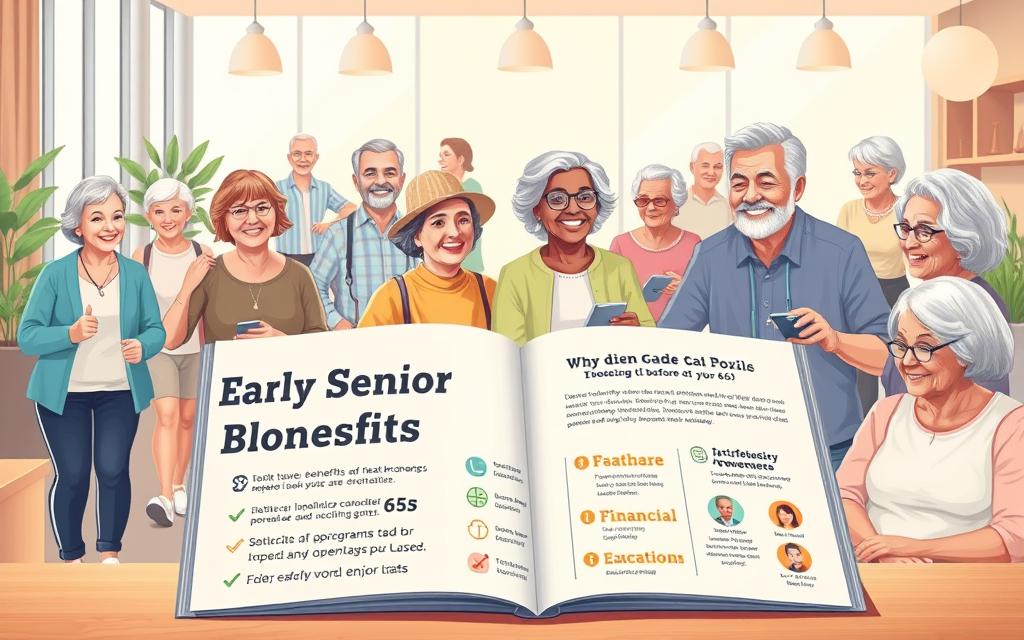How Old to Qualify as a Senior Citizen?
Yesterday, I saw an older man struggle to show his ID for a senior discount at the store. He looked unsure about when he became a senior. You might wonder when you’ll be considered a senior too. The answer changes based on who you ask and what benefits you want.
Figuring out when you’re a senior is not simple. Many think it’s 65, but it’s more complicated. Each group, like businesses and government, has its own rules for being a senior.
Knowing when you’re a senior affects your Social Security and Medicare. The old retirement age of 65 is not always the case today. Knowing when you’re a senior helps you plan for the future.
Key Takeaways
- The official senior citizen age typically starts at 65 for most government programs
- Some retailers and businesses offer senior discounts starting as early as age 50
- Medicare eligibility begins at age 65, while Social Security benefits can start at 62
- Different countries and states have varying definitions of senior citizenship
- Early senior benefits may be available from age 55 in certain programs
- Your working history can impact when and how you qualify for senior benefits
Understanding What Age You’re Considered a Senior Citizen
When you think about the age of seniorhood, you might wonder what others say. People often ask when they’re seen as considered a senior citizen. This is for getting benefits, discounts, and joining government programs. But, the answer isn’t easy.
The Official Age of Seniorhood in Different Countries
Every country has its own way of seeing who’s a senior. In the United States, you’re seen as a senior at 65. Canada also says 65 is the age. Japan starts retirement at 60, and Australia at 66.
Why Age 65 Became the Traditional Retirement Age
The number 65 became important in 1935 with Social Security. Back then, people didn’t live as long. So, 65 was seen as the start of old age. Now, even though we live longer, 65 is the age for Medicare and pensions.
How the Merriam-Webster Dictionary Defines a Senior Citizen
The Merriam-Webster dictionary defines a senior as an older person, often retired. This definition seems wide. But, a senior citizen is usually seen as 60 or 65 and older. This shows how aging is viewed differently in different places.
How Old to Qualify as a Senior Citizen
The age to qualify as a senior citizen changes with each benefit. Retirement is not just one age. Different programs start at different times. Knowing these ages helps plan for your future.
Government Programs Starting at Age 65
At 65, you get medicare and other federal benefits. This age marks the start of retirement in the U.S. You get full Medicare, including hospital and medical insurance. Many states also start services at this age.
When You Become Eligible for Medicare and Social Security
Medicare starts at 65 for most. You must sign up during your Initial Enrollment Period. This starts three months before your 65th birthday. Social Security retirement starts later, but you can get reduced benefits at 62.
Early Senior Benefits Beginning at Age 62
At 62, you can get early Social Security benefits. These monthly payments are less, but you get them sooner. Some jobs offer early retirement at 62. Restaurants and stores also offer discounts starting at 62.
The Different Age Thresholds for Senior Status
Wondering when you’ll be considered a senior? It’s not just one age. Different groups have their own ages for seniors. This means you can start getting senior benefits earlier than you think.
Some benefits start at age 50. AARP welcomes members at this age. They get discounts and special offers. At 55, you get even more perks. Restaurants offer lower prices and you can join Manitoba’s 55 PLUS program.
At 60, you get more benefits. If your spouse gets government help, you might get spousal allowances. This age is a big step towards being a full senior.
| Age Threshold | Available Benefits | Examples |
|---|---|---|
| Age 50 | Early Senior Discounts | AARP Membership, Select Retail Stores |
| Age 55 | Expanded Discounts & Programs | Restaurant Discounts, 55 PLUS Programs |
| Age 60 | Spousal Benefits | Allowance for Spouses, Enhanced Discounts |
| Age 65 | Full Senior Benefits | Medicare, Social Security, OAS |
Knowing about these ages helps you plan. Each age brings new chances to save and get special senior services.
Senior Discounts: When Do They Start?
Many senior discounts start early, before you retire. Some places offer them at 55 or 50. This can help you save money on dining, shopping, and banking.

Restaurants That Offer Senior Discounts at Age 55
*Denny’s* gives a 15% discount to those 55 and up every Thursday. Other restaurants also offer early discounts. For those 60 and older, *The Pantry* halves meal prices on Mondays. At 65, *Mandarin Restaurant* offers 20% off buffet with a valid ID.
Retail Stores With Senior Discounts Starting at Different Ages
*Shoppers Drug Mart* offers 20% off every Thursday with a PC Optimum card. Many seniors save a lot by shopping on these days.
Financial Institutions with Special Senior Banking Benefits
Banks have special accounts for seniors. *BMO* waives fees for those 60 and up. *CIBC’s* Smart for Seniors account starts at 65 with lower fees. *Scotiabank* also offers fee cuts for seniors. These can save you $120 to $200 a year.
Government Benefits and When You Become Eligible
Turning age 65 or older is a big deal. It means you can get government benefits to help in your retirement. Knowing about these programs helps you plan for a good future.
Old Age Security (OAS) Requirements at Age 65
At 65, you can apply for Old Age Security payments. You must have lived in Canada for at least 10 years after turning 18. The highest monthly payment is $727.67 for those 65-74, and $800.44 for those 75 and older.
Canada Pension Plan and Full Retirement Age
The Canada Pension Plan gives senior benefits based on your work. You can get payments at 60, but waiting until full retirement age gives more money. The highest monthly payment in 2025 is $1,433.00.
Guaranteed Income Supplement for Low-Income Seniors
The Guaranteed Income Supplement helps if you’re not making much money. Single seniors with less than $21,624 a year become eligible. Couples with incomes between $28,560 and $51,840 might also get it. Your work history doesn’t matter for GIS, so all low-income seniors age 65 or older can get it.
Early Senior Benefits Before Age 65
You don’t have to wait until you’re 65 to get access to senior discounts. Many places offer savings and support early on. Knowing when you can get these perks helps with your money planning.

At age 55, you’re considered a senior by many. Places like Denny’s and IHOP give 10-15% off meals. Stores like Ross and Kohl’s have special shopping days for seniors.
The age for senior benefits changes with each program. Banks like Chase and Wells Fargo offer special accounts at 60. These accounts have free checks and no monthly fees.
Government programs help before you turn 65. If your spouse gets the Guaranteed Income Supplement, you might get the Allowance. This gives up to $1,313.67 a month for living costs. Widowed people also get help during tough times.
To get these benefits of senior status, know what you qualify for. Look into senior benefits near you when you’re 55. Every dollar saved and benefit claimed makes retirement easier.
Provincial and State Programs for Senior Citizens
Your golden years bring many chances to get help. Each area has special programs for seniors. These programs help with money and age needs.
Manitoba 55 PLUS Program for Those Age 55 and Older
The Manitoba 55 PLUS Program helps those 55 and up. It gives money to those who need it before they’re officially seniors. If you’re under 65, you can apply for this help.
Property Tax Relief and Senior Health Insurance Options
Property tax relief changes by state and province. It can save a lot on your home. Some places let you delay paying until your home sells.
Senior health insurance helps too. It covers what Medicare doesn’t and lowers drug costs.
Additional Benefits Based on Your Specific Age Range
What benefits you get depends on your age. As you get older, you might get more help. This includes things like bus passes and fuel help.
Most places sign you up automatically. But Alberta and New Brunswick need you to apply yourself.
How Working History Affects Your Senior Citizen Status
Your work history is key in figuring out what it means to be a senior. It also decides which benefits you can get. Many think work history directly affects when you’re seen as a senior. But, it’s actually more complex.
For Old Age Security (OAS) benefits, your work history doesn’t matter. You can get OAS pension whether you’ve never worked or are working past retirement age. This surprises many seniors who think their limited work might stop them.

If you worked abroad for Canadian employers like the Canadian Armed Forces or big banks, that counts. You must come back to Canada within six months of finishing work or reach 65 while working abroad to keep your senior status.
The Canada Pension Plan (CPP) has its own rules. You need to have made at least one contribution to qualify for benefits. There are special rules for parents who lowered their earnings to raise kids. This ensures their retirement benefits aren’t cut unfairly.
Knowing these differences helps you plan for retirement better. Your work history decides which benefits you’ll get, not whether you’re considered a senior.
Planning for Your Transition into Senior Citizenship
Getting ready for senior citizenship needs careful planning. You must know when to apply for benefits. This is important at age 65 or older.
Take the right steps on time. This way, you get all the benefits you deserve.
When to Apply for Senior Benefits and Social Security
Start your social security application three months before you want benefits. You can apply online, call 1-800-772-1213, or visit your local office. File your tax return by April 30 each year.
Understanding Medicare Eligibility at Age 65 or Older
Your Medicare eligibility starts three months before you turn 65. Sign up in the next seven months to avoid penalties. Medicare Part A covers hospital stays.
Part B handles doctor visits and outpatient care. Many add Part D for prescription drugs.
Preparing for Senior Living Communities and Care Services
Senior living communities offer different support levels. Research early, from independent senior living to assisted living. Senior care services include meal delivery and home health aides.
Programs like Home Adaptations for Seniors’ Independence help low-income seniors. They make homes safer and more accessible.
Conclusion
Knowing when you become a senior citizen is important. It helps you enjoy your golden years more. In the U.S., turning 65 is when you get many government benefits like Medicare and Social Security.
You don’t have to wait until 65 to start feeling like a senior. Many places offer discounts to people as young as 55 or 50. It’s good to ask about these discounts when you shop or eat out.
Being a senior is a special time for everyone. It’s good to know about all the benefits you can get. From early bird specials to government help, each age brings new chances. Look into what’s available now and plan for the future.
Resources:
Q: When can I start receiving senior discounts?
FAQ
Q: At what age are you considered a senior citizen in USA?
A: In the United States, the age at which you’re considered a senior citizen depends on the context—there’s no single universal definition.
Q: When can I start receiving senior discounts?
A: You can get senior discounts at 50 at some places! Denny’s gives discounts at 55. BMO has special accounts for seniors at 60. Check each place for their rules.
Q: What government benefits become available at age 65?
A: You get big government benefits like Social Security and Medicare at age 65 or younger.
FAQ
Q: At what age are you considered a senior citizen in Canada?
A: In Canada, you’re a senior at 65. This is when you get big government benefits like OAS and CPP. But, some places give discounts at 55 or 50.
Q: When can I start receiving senior discounts?
A: You can get senior discounts at 50 at some places! Denny’s gives discounts at 55. BMO has special accounts for seniors at 60. Check each place for their rules.
Q: What government benefits in Canada become available at age 65?
A: At 65, you get OAS up to $727.67 monthly. You also get CPP up to $1,433.00 in 2025. Plus, GIS for low-income seniors.
Q: Can I access any senior benefits in Canada before age 65?
A: Yes! You can get many benefits before 65. At 55, you get Manitoba 55 PLUS and discounts. At 60, spouses can get Allowance. Some discounts start at 50, so check your area.
Q: Do I need to have worked to qualify for Old Age Security in Canada?
A: No, you don’t need to work for OAS. You can get it even if you’ve never worked. You just need to be 65 or older and lived in Canada for 10 years after 18.
Q: When should I apply for senior government benefits?
A: Apply for OAS six months before turning 65. Government benefits need you to apply. Also, file your taxes by April 30 every year.
Q: What’s the difference between retirement age and senior citizen age?
A: 65 is the senior age in Canada. But, you can retire from 55 to 71. Retirement age depends on when you want to stop working.
Q: Are there special programs for low-income seniors?
A: Yes, there are programs for low-income seniors! GIS helps those earning less than $21,624. Manitoba 55 PLUS gives up to $161.80 monthly. Most provinces offer help with rent, drugs, and taxes.
,433.00 in 2025. Plus, GIS for low-income seniors.
Q: Can I access any senior benefits before age 65?
A: Yes! You can get many benefits before 65. At 55, you get Manitoba 55 PLUS and discounts. At 60, spouses can get Allowance. Some discounts start at 50, so check your area.
Q: Do I need to have worked to qualify for Old Age Security?
A: No, you don’t need to work for OAS. You can get it even if you’ve never worked. You just need to be 65 or older and lived in Canada for 10 years after 18.
Q: When should I apply for senior government benefits?
A: Apply for OAS six months before turning 65. Government benefits need you to apply. Also, file your taxes by April 30 every year.
Q: What’s the difference between retirement age and senior citizen age?
A: 65 is the senior age in Canada. But, you can retire from 55 to 71. Retirement age depends on when you want to stop working.
Q: Are there special programs for low-income seniors?
A: Yes, there are programs for low-income seniors! GIS helps those earning less than ,624. Manitoba 55 PLUS gives up to 1.80 monthly. Most provinces offer help with rent, drugs, and taxes.



